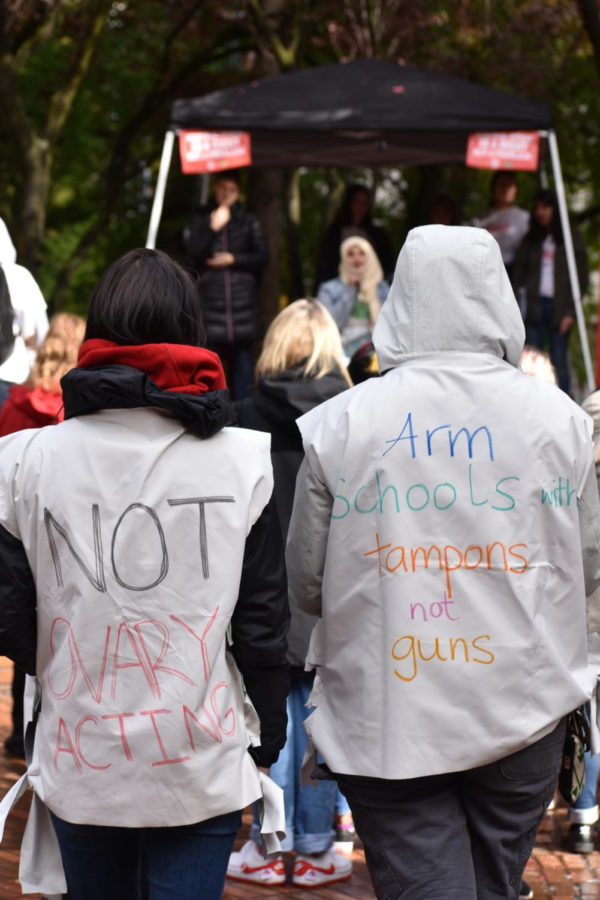Portland fights for menstrual rights
Two activists stand in the rain wearing decorated ponchos to show their support.
While attending Catlin Gabel School in 2014, Nadya Okamoto started PERIOD, the menstrual movement and non-profit. Okamoto was inspired to start the movement while she and her family struggled with houselessness.
She realized one of the biggest obstacles for menstruators was access to menstrual products and that menstruators often had to choose between food and period products.
The movement targets period poverty, which is the inability to afford menstrual products. The non-profit runs educational workshops, starts conversations about periods and period poverty, fights for a systemic change towards menstrual equity and most recently, held rallies for National Period Day on Oct. 19, 2019.
“We came up with the idea just a few months ago – that is why it is so exciting and nerve-racking that just a few months later, we have rallies confirmed in all 50 states,” said Okamoto.
National Period Day is a day dedicated to periods, and focuses on the tax on all menstrual products within a state, also called by many activists the “tampon tax.” This tax currently exists in 35 states, and it is one of the movement’s biggest grievances.
Oregon is one of the 15 states that does not have a tax on menstrual products. In addition, in June of this year, the Oregon Legislative Assembly passed a law that mandates free menstrual products in all correctional facilities.
This didn’t stop Portlanders from rallying on Saturday to support menstruators across the country.
Alex Haddon, a non-menstruator, Lincoln junior and a member of Lincoln’s PERIOD club, said he attended the rally “to support his friends and menstruators and to repeal the tax on menstrual products.”
One of the organizers for the Portland rally, Aishwarya Marathe, said that the rally was planned to “make it loud and proud that [the fight against menstrual inequity] isn’t going away until things change.”
Another speaker at the rally, Tanzila Khan, came from Pakistan to speak about her contributions to the movement. Khan started GirlyThings, a service that delivers menstrual products to people who need but cannot access them.
While the demonstrations were a big step for the movement, there are other issues that still need to be tackled.
Many people see this as solely a women’s issue, but not everyone that menstruates is a woman, and not all menstruators identify as women.
The organizers of the Portland rally commended people of all genders for attending, even if they were not menstruators.
“If we stop framing it as just a women’s issue, we can start a more open conversation and make sure we are being inclusive in our activism,” said Okamoto.
Portland mayoral candidate, Sarah Iannarone, spoke about how she got her period in the middle of a mayoral debate and felt uncomfortable to ask for a break in order to address it. Since this experience, Iannarone has learned to embrace her period for what
it is. “It’s what makes me strong, it’s what makes me capable,” said Iannarone. “Let’s make Portland a city that’s period proud.”

